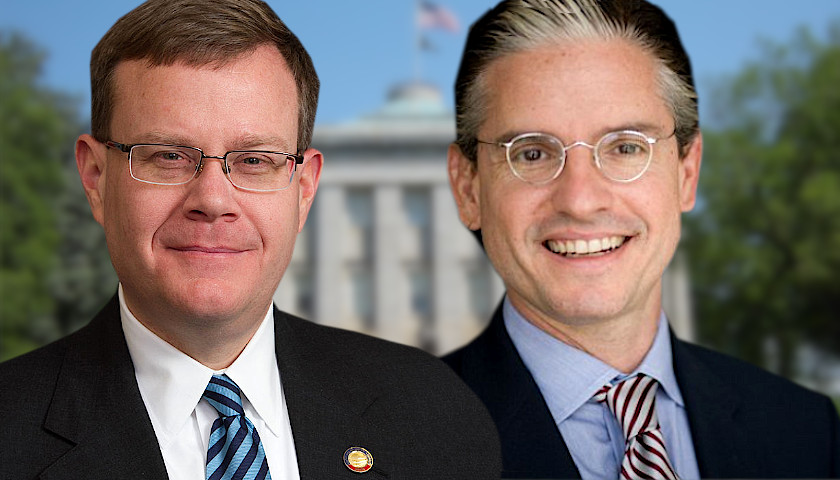The Campaign for Accountability (CfA), a Washington, D.C. non-profit, filed a second ethics complaint Monday against North Carolina’s Speaker of the House Tim Moore after their first one was dismissed.
The first complaint filed by CfA was dismissed on December 28, 2018, mainly because it failed to prove Moore knowingly used his position to leverage financial gain.
The second CfA complaint claims to contain “new documents” and questions the findings of the North Carolina Ethics Commission.
CfA’s hints at impropriety by one of Speaker Moore’s legislative aides, Mitch Gillespie, who “intervened” in the case by seeking a status report about tank cleanup issues.
“New documents obtained by Campaign for Accountability reveal that one of Speaker Moore’s legislative aides inquired with DEQ officials about Speaker Moore’s company after it apparently violated several environmental regulations,” CfA Executive Director Daniel E. Stevens said in a statement.
“The documents indicate that yet again Speaker Moore appears to have attempted to use his official position to enrich himself. North Carolina officials should immediately investigate whether Speaker Moore directed his aide, a former DEQ official, to contact the agency on his behalf,” Stevens’ statement said.
These new documents, according to CfA, were obtained on November 29, 2018. That’s one month before their original complaint was dismissed by North Carolina ethics panel officials.
The new complaint almost goes as far as to accuse state regulators of mishandling the case, stating that DEQ “does not appear to have issued any civil penalties to Southeast despite the company’s repeated violations.”
The original CfA complaint was filed in March of 2018. The State Board of Elections and Ethics Enforcement issued a notice of dismissal on December 28.
The dismissal document notes that the tax incentives claim was quickly found to be without merit and was dismissed in May of 2018.
The 2018 complaint accused Speaker Moore of using his office to improperly “to secure preferential treatment for his personal financial gain” with respect to a Southeast Land Holdings property sale.
Moore is one of the owners of Southeast Land Holdings. The deal in question involved the purchase of Townsend Poultry Plant in Siler City for $85,000. Southeast later sold the plant for $550,000—a $465,000 profit.
The 2018 complaint also involves accusing Moore of abusing his position by offering tax incentives to make the property more valuable for sale, and that Moore tried to dodge state regulations governing underground tanks and extension dates related to their cleanup.
Late compliance filings by Speaker Moore are indicated as being the crux of the confusion. The rest of the claims regarding interference with state regulations were investigated further but were found without merit in the December dismissal letter.
“This complaint is a meritless election-year political ploy,” House Speaker Tim Moore said at the time the 2018 complaint was filed. Moore has not yet commented on CfA or the new ethics complaint.
CfA is closely linked to David Brock, known for being a Democratic political operative tied to George Soros and Hillary Clinton. Brock is also the founder of a progressive propaganda outlet known as Media Matters.
Brock’s various organizations, such as American Bridge and Citizens for Responsibility and Ethics in Washington (CREW) are behind multiple legal attacks on the Trump Administration.
CfA is staffed by multiple Brock-tied organization alums. CfA was co-founded in 2015 by Louis Mayberg, the former chairman of CREW and Anne Weismann, CREW’s former chief counsel and current chief Freedom of Information Act counsel.
CREW’s purpose to date has been to be launch politically motivated legal battles against Republican elected officials. CfA seems to be doing more of the same.
According to their website, CfA is a “501(c)(3) non-profit, nonpartisan watchdog organization that uses research, litigation and aggressive communications to expose misconduct and malfeasance in public life.”
While CfA seeks transparency and “exposure” for others, the organization’s funding is a bit secretive.
In an investigative article by SiliconBeat, it was discovered a large portion of CfA’s funding was funneled through a grant from the New Venture Fund. New Venture Fund, and organizations like it, serve as a firewall between donors and recipients, in essence, hiding the original source of grant funding.
– – –
A.P. Dillon is a reporter at Battleground State News.
Photo “David Brock” by David Brock.
Background Photo “North Carolina Capital” by Chanilim714. CC BY-SA 3.0.





